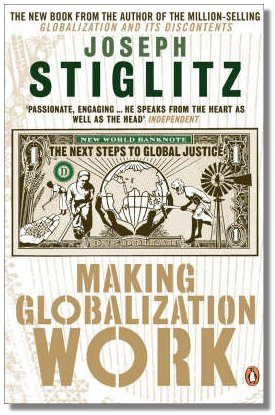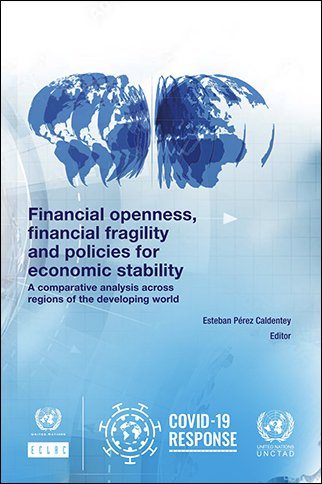Publisher: Third World Network Year: 2023 No. of pages: 42 Download now About the Book…
Making Globalisation Work: The Next Steps to Global Justice Author: Joseph Stiglitz (Review by Praveen Jha)

Publisher: Penguin Books, UK.
ISBN 13: 9780141024967
About the book
Why isn’t globalization benefiting as many people as it should? Joe Stiglitz shows us that things can change and that an optimistic world can exist where globalization really does work. Stiglitz examines how change has occurred rapidly over the past four years, proposing solutions and looking to the future. He puts forward radical new ways of dealing with the crippling indebtedness of developing countries, a new system of global reserves to overcome international financial instability and a new framework, combining economic incentives and principles of equity, for dealing with the greatest threat to our planet, global warming – one which is more likely to be accepted both by the US and the developing world than previous proposals. He argues convincingly for the reform of global institutions such as the UN, the IMF and the World Bank to make them truly capable of responding to the problems of our age and shows why treating developing countries more fairly is not only morally right, but ultimately will be to the benefit of the developed countries as well.
About the Author
Joseph Stiglitz was Chief Economist at the World Bank until January 2000. Before that he was Chairman of President Clinton’s Council of Economic Advisors. He is currently Professor of Finance and Economics at Columbia University. He won the Nobel Prize for Economics in 2001.
Review by Praveen Jha
In the intellectual debates and discourses in the social sciences, for almost three decades now, ‘globalisation’ has been a much stalked and bitterly contested theme. It has both been praised and pilloried in substantial measure, and there is little reason to believe that the dust will settle in the foreseeable future. Partly such as outcome is an inevitable consequence of irreconcilable perspectives and concerns, but it also has to do with the fact that globalization is a moving target and thus we have a spectrum of trajectories and a plurality of meanings. Nonetheless, it may not be off the mark to suggest that the recent experiences of globalization have largely been contextualized within the ideology and policy regime of laissez faire, or, to use a phrase much in currency these days, ‘market fundamentalism’. It is quite apt to characterize, as many researchers do, such a globalization as neoliberal globalization.
As regards the balance sheet, in terms of economic outcomes, of neoliberal globalization over the last three decades, most observers would agree that the debit side of the ledger has started causing much concern even to the cheer leaders (of globalistion), and there is a growing list of mainstream economists voicing their discomfort for several reasons. For instance, just to name a couple of eminent economists who have joined the bandwagon in the recent times: Paul Samuelson’s worry is that the interests of the United States of America have been hurt badly by a globalised China; Lawrence Summers, (nick-named as “Mr Globalisation’ by Dani Rodrik for his earlier ardent advocacy), has now ‘discovered’ the risk of globalization driven race to the bottom through dilution of national regulations; Alan Blinder has expressed serious concern about the economic battering confronting the labour force in the US; and so on. [Readers interested in further discussion on growing critique of globalisation within mainstream economists and policy makers may like to read a recent piece by Dani Rodrik: The Death of Globalization Consensus, July 25, 2008, on ‘Policy Innovations’ – The Carnegie Council’s online magazine for a fairer globalization].
However, as should be evident, the concerns cited above, although important, are very selective and hence also inadequate reflections. Arguably, within the mainstream, the Nobel Prize winning economist Joseph Stiglitz has had an incomparable intellectual appetite for sustained and comprehensive critical engagement with globalization. In an earlier work, Globalisation and its Discontents (published in 2002), he offered a trenchant critique of the models of globalization pushed by the developed countries largely through the powerful institutions like the IMF, the World Bank and the WTO. Given his pedigree – having served as a member of the Council of Economic Advisers of President Clinton and as a top official of the World Bank, but above all as a most distinguished theorist in the mainstream of the profession – it is hardly surprising that the above mentioned book assumed the status of a classic in no time.
Making Globalisation Work, is a worthy sequel to the author’s earlier work, as it carries forward a no-holds-barred frontal attack on (neoliberal) globalization; [the adjective has been put in the bracket as Stiglitz may have obvious reservations with it]. Quoting approvingly a few lines from the 2004 report of the World Commissions on the Social Dimensions of Globalisation, of which he was a member, the author highlights some of his core concerns: ‘The current process of globalization is generating unbalanced outcomes, both between and within countries. Wealth is being created, but too many countries and people are not sharing in its benefits. They also have little or no voice in shaping the process. Seen through the eyes of the vast majority of women and men, globalization has not met their simple and legitimate aspirations for decent jobs and a better future for their children. Many of them live in the limbo of the informal economy without formal rights and in a swathe of poor countries that subsist precariously on the margins of the global economy. Even in economically successful countries some workers and communities have been adversely affected by globalization. Meanwhile the revolutions in global communications heightens awareness of these disparities … these global imbalances are morally unacceptable and politically unsustainable. (page 8).
The author goes on to argue that such outcomes were almost inevitable for several reasons, the important ones among which include: (a) the rules of the game governing globalization are unfair, as these are designed to serve interests of the advanced industrial countries; (b) the way globalization has been pressed into service has resulted in loss of sovereignty for most developing countries – infact in some cases it has essentially been imposed from outside – and this has obviously crippled the abilities of relevant governments to take decisions central to the well-being of citizens; and, (c) much of the globalization, an any case, is theoretically rooted in market fundamentalism, or a sort of voodoo economics.
These (and many more) arguments are substantiated with rigour and persuasion, and illustrations are drawn from several economies in many parts of the world. Furthermore, like his above mentioned earlier book, this one too is written in manner that makes the arguments accessible to non-professional economists as well.
Sure enough, as the title of the book suggests, Stiglitz is not against globalization per se; on the contrary, he is of the view that greater integration of national economies, (or globalization), if properly managed, can do a great deal to benefit both the developing and the developed countries of the world. In fact the thrust of the book is to set out and elaborate the rules of the game (at least the more important ones) which can contribute to a trajectory of globalization that is better/fairer. The author’s underlying economic philosophy to shape such a path of globalization may be summed up as: ‘Development is about transforming the lives of people, not just transforming economies’ (p. 50); and that markets, governments, individuals and communities – all these are important ‘pillars of successful development strategy’ (p. 51).
Towards his vision of a desirable globalization, the author makes a spirited and powerful case for policy overhauls, through detailed proposals, in a whole range of specific areas as well as the overall global economic framework. Some of the critical themes covered in the book include: policies to make international trade fair for the developing countries; measures to curb excessive greed underlying the current patent regimes to ensure that the fruits of technological and scientific advances are affordable to the masses and serve the needy; ways of dealing with the crippling indebtedness of developing countries; suggestions towards equitable access to global natural resources and their use in ways that save our threatened planet (for instance, from the scourge of global warming); and a proposal for a new system of global reserves, (reminiscent of the ‘bancor’ proposal by J.M. Keynes towards the end of the Second World War), to overcome international financial instability. As is well-known, these themes have been at the centre stage of globalization debates, and Stiglitz’s accounts of the contentions issues, not surprisingly, are outstanding. Furthermore, his diagnosis and prescriptions are as compelling as any serious economic policy discourse. Also, as mentioned earlier, the analyses and arguments are presented in a manner that even non-economists will be able to follow. Thus, on the whole, coming from the stable of professional economists, this book is in the category of ‘must read’ on the nature and consequences of contemporary globalization and, what the author prescribes as ‘the next steps to global justice’.
However, it is with reference to the possibility of ‘such steps’ (and not their unquestionable desirability), that the readers may find this otherwise excellent study not quite convincing. As the author stresses frequently, for globalization to move in a desirable direction, the reform of global institutions, such as the World Bank, the IMF, the WTO etc., powerful economic entities such as the multinational corporations as well as the vested interest groups in advanced (and developing) countries, is a necessary condition. Sure enough – but how does it happen? Who will bell the cat and how? The author, in the concluding sentences of the last chapter, says: ‘For much of the world, globalization as it has been managed seems like a pact with the devil’ (p. 292). Then he goes on to add: ‘This is not how it has to be’ (ibid). If this claim has to go beyond a wishful assertion, one has to spell out the processes and agencies by which the dominant powers are persuaded/forced to look beyond their nose. To extend/rephrase Stiglitz’s metaphor, the neoliberal globalization that the world has seen is not a ‘pact with the devil’ as much as a ‘pact among the devils and for the devils’. It is difficult to see how the powerful economic interests, which control the levers of power and rule-making arrangements in the global economy, can be persuaded to renounce their grip on the global architecture of power. Those nursing such prospects only need to recall what the most powerful, and possibly the most vicious among the rouge states in the recent times, namely the one in the USA under the sway of neoconservatives, has done in Iraq, basically to grab oil, to the utter horror and dismay of the overwhelming majority of humanity across the globe. As is well-acknowledged, the crude drama of ‘liberating Iraq from its monstrous dictator and saving other countries from the weapons of mass destruction’, that was enacted prior to the attack, showed total contempt for norms of civilized discourse in an almost fabricated ‘conflict’ situation.
Sure enough, there may not be easy answers to the questions as regards how to redress problems of huge inequities – economic, social and political – across and within countries. But not confronting these questions directly can hardly take us in the direction of a fair and just globalization.
About the Reviewer
Praveen Jha is on the faculty of the Centre for Economic Studies and Planning, Jawaharlal Nehru University



